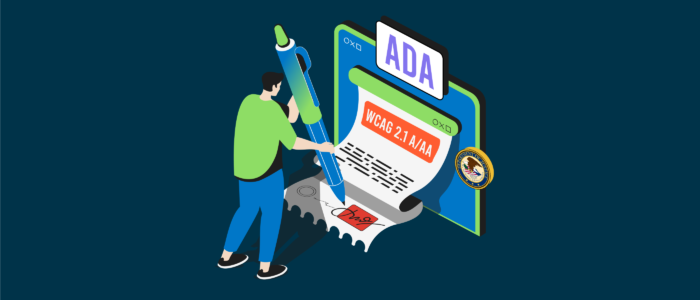What the US DoJ adopting WCAG 2.1 A/AA in ADA Title II for Web and Mobile Apps means for you
I’m thrilled to see that the US Justice Department just announced an advanced copy of a final rule to improve web and mobile app accessibility for people with disabilities. The Americans with Disability Act (ADA) already made it clear that US websites must be accessible, but the ADA had not specified exactly how to measure compliance. This new rule clarifies that the technical standard for digital accessibility for ADA Title II is WCAG 2.1 A and AA. Title II of the ADA is focused on US state and local government websites and mobile apps.
This new US rule aligns perfectly with Deque’s longstanding commitment to digital equality. Deque’s experts have collaborated closely with policymakers, technology leaders, and the W3C to help develop WCAG 2.1 to be a pragmatic standard that objectively defines how to measure the minimal requirements for accessible digital experiences.
With this new law, I’m sure you have questions, and we have answers.
- Does this new US law directly apply to me? Title II of the ADA and this new law are crisply focused on US state and local government.
- Does this new US law indirectly apply to me? Yes, if you are a .com, .gov, .edu, or .org that is open to the US public (except for religious entities and private clubs).
- While this new law is focused on Title II of the ADA, the full ADA is a very broad civil rights law that prohibits discrimination against people with disabilities in employment, architectural design, transportation, examinations and courses, and other services offering public accommodation. The US Department of Justice has made it crystal clear that the ADA applies to all US organizations (with exceptions for religious entities and private clubs). Want to see some real-world examples:
- Are there any content exceptions? Yes, content exceptions include archived web content, pre existing conventional documents, some third-party content, and preexisting social media posts.
- How much time do I have to meet WCAG 2.1 A/AA? US state and local governments have two or three years to meet this requirement, depending on their population.
| US State and Local Gov Size | Compliance Date |
| 0 – 49,999 people | April 26, 2027 (3 years after rule was published)* |
| Special district governments | April 26, 2027 (3 years after rule was published)* |
| 50,000 or more people | April 24, 2026 (2 years after rule was published)* |
* This rule was published in the US Federal Register on April 24, 2024.
Why is Deque uniquely positioned to support you as you navigate these new requirements?
- Our experts helped write WCAG 2.1 A/AA.
- We bring real-world, hands-on experience testing for WCAG 2.1 A/AA since June 2018 (when WCAG 2.1 was finalized).
- Actually, Deque began testing for WCAG 2.1 A/AA before it was even finalized because we volunteered as a proof-of-concept to implement WCAG 2.1 A/AA to make sure it was attainable.
- Deque University has everything you need to understand how to design, develop, and test for WCAG 2.1 A/AA.
- Last but not least Deque has been a pioneer in automated digital accessibility testing for over two decades. Deque is best known for its flagship offering known as axe, a suite of tools that fit frictionlessly into the development, content, and governance workflows, built on a common platform to provide consistency and accuracy where it matters. The axe suite consisting of monitoring, AI-powered interactive testing, and automated testing tools fits easily into today’s digital workflows making accessibility efficient and scalable across the software development lifecycle.
Our expertise in digital accessibility standards, combined with our suite of tools and services designed to ensure compliance with the WCAG 2.1 guidelines, means we are already primed to help you meet, and if you choose, exceed these new standards.
We see this rule not only as a validation of the path we’ve been on but also as a call to action for all US .gov organizations to prioritize accessibility and inclusion for all.
